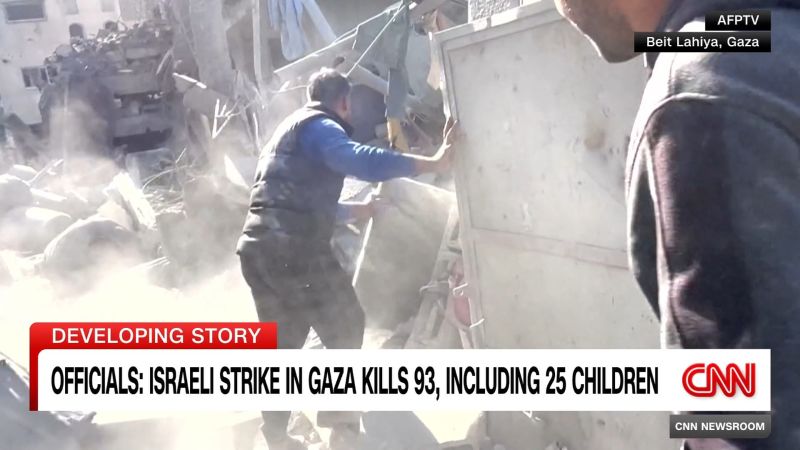October 31, 2024
Is Netanyahu Ignoring Israel’s Completed Military Operations in Gaza and Lebanon?
 Israel's military leaders have indicated that their operations in Gaza and Lebanon have achieved their objectives and that it is now time to assess the situation. However, there is uncertainty about whether Israeli Prime Minister Benjamin Netanyahu will heed their advice amid growing political tensions within the country.
The recent conflicts in Gaza and Lebanon have been a source of concern for both Israeli officials and the international community. In Gaza, the Israeli military launched a series of air strikes targeting Hamas and other militant groups in response to rocket attacks from the Palestinian territories. In Lebanon, Israel conducted airstrikes against Hezbollah positions in response to alleged cross-border attacks.
In both cases, Israeli military leaders have claimed to have successfully degraded the capabilities of their adversaries and met their strategic objectives. The Israeli Defense Forces (IDF) have asserted that they have significantly reduced the military capabilities of Hamas in Gaza and Hezbollah in Lebanon. These assertions have been supported by reports of destroyed infrastructure and casualties among the militant groups.
Despite the military's claims of success, there are concerns about the long-term consequences of the recent operations. The conflicts in Gaza and Lebanon have once again brought to the forefront the issue of civilian casualties and the humanitarian impact of such military actions. There have been widespread reports of civilian deaths and infrastructure damage in both Gaza and Lebanon, leading to international condemnation and calls for a ceasefire.
Moreover, the military operations have also raised questions about the broader political implications for Israel. Netanyahu is facing a political crisis at home, with ongoing protests against his government's handling of the COVID-19 pandemic and corruption allegations against him personally. The recent military actions in Gaza and Lebanon have added to the turmoil, with opposition leaders criticizing the government's response and calling for a change in leadership.
In light of these developments, Israeli military leaders are urging caution and a reevaluation of the situation. They argue that further military escalation may not be in Israel's best interests and that diplomatic efforts should be pursued to achieve lasting peace and stability in the region. However, Netanyahu has so far resisted calls for restraint, emphasizing Israel's right to defend itself and vowing to continue the fight against its enemies.
The coming days will be critical in determining the course of action that Israel will take in response to the recent conflicts in Gaza and Lebanon. Will Netanyahu listen to the advice of the military leadership and pursue a more diplomatic approach, or will he continue on the current path of military escalation? The answer to this question will have far-reaching implications for Israel's security, its relationships with its neighbors, and its standing in the international community.
Israel's military leaders have indicated that their operations in Gaza and Lebanon have achieved their objectives and that it is now time to assess the situation. However, there is uncertainty about whether Israeli Prime Minister Benjamin Netanyahu will heed their advice amid growing political tensions within the country.
The recent conflicts in Gaza and Lebanon have been a source of concern for both Israeli officials and the international community. In Gaza, the Israeli military launched a series of air strikes targeting Hamas and other militant groups in response to rocket attacks from the Palestinian territories. In Lebanon, Israel conducted airstrikes against Hezbollah positions in response to alleged cross-border attacks.
In both cases, Israeli military leaders have claimed to have successfully degraded the capabilities of their adversaries and met their strategic objectives. The Israeli Defense Forces (IDF) have asserted that they have significantly reduced the military capabilities of Hamas in Gaza and Hezbollah in Lebanon. These assertions have been supported by reports of destroyed infrastructure and casualties among the militant groups.
Despite the military's claims of success, there are concerns about the long-term consequences of the recent operations. The conflicts in Gaza and Lebanon have once again brought to the forefront the issue of civilian casualties and the humanitarian impact of such military actions. There have been widespread reports of civilian deaths and infrastructure damage in both Gaza and Lebanon, leading to international condemnation and calls for a ceasefire.
Moreover, the military operations have also raised questions about the broader political implications for Israel. Netanyahu is facing a political crisis at home, with ongoing protests against his government's handling of the COVID-19 pandemic and corruption allegations against him personally. The recent military actions in Gaza and Lebanon have added to the turmoil, with opposition leaders criticizing the government's response and calling for a change in leadership.
In light of these developments, Israeli military leaders are urging caution and a reevaluation of the situation. They argue that further military escalation may not be in Israel's best interests and that diplomatic efforts should be pursued to achieve lasting peace and stability in the region. However, Netanyahu has so far resisted calls for restraint, emphasizing Israel's right to defend itself and vowing to continue the fight against its enemies.
The coming days will be critical in determining the course of action that Israel will take in response to the recent conflicts in Gaza and Lebanon. Will Netanyahu listen to the advice of the military leadership and pursue a more diplomatic approach, or will he continue on the current path of military escalation? The answer to this question will have far-reaching implications for Israel's security, its relationships with its neighbors, and its standing in the international community.
If you would like to delve into the world of investment topics , go to our partner project Wall Street Wizardry


